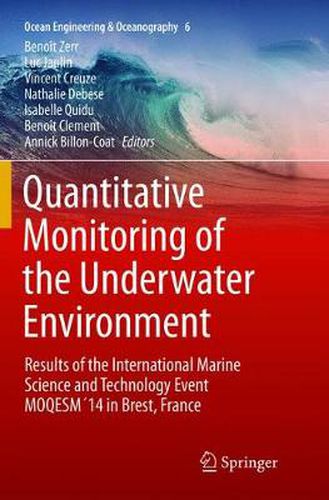Readings Newsletter
Become a Readings Member to make your shopping experience even easier.
Sign in or sign up for free!
You’re not far away from qualifying for FREE standard shipping within Australia
You’ve qualified for FREE standard shipping within Australia
The cart is loading…






This title is printed to order. This book may have been self-published. If so, we cannot guarantee the quality of the content. In the main most books will have gone through the editing process however some may not. We therefore suggest that you be aware of this before ordering this book. If in doubt check either the author or publisher’s details as we are unable to accept any returns unless they are faulty. Please contact us if you have any questions.
This volume constitutes the results of the International Conference on Underwater Environment, MOQESM'14, held at Le Quartz Conference Center in Brest, France, on October 14-15, 2014, within the framework of the 9th Sea Tech Week, International Marine Science and Technology Event. The objective of MOQESM'14 was to bring together researchers from both academia and industry, interested in marine robotics and hydrography with application to the coastal environment mapping and underwater infrastructures surveys.
The common thread of the conference is the combination of technical control, perception, and localization, typically used in robotics, with the methods of mapping and bathymetry.
The papers presented in this book focus on two main topics.
Firstly, coastal and infrastructure mapping is addressed, focusing not only on hydrographic systems, but also on positioning systems, bathymetry, and remote sensing. The proposed methods rely on acoustic sensors such as side scan sonars, multibeam echo sounders, phase-measuring bathymetric sonars, as well as optical systems such as underwater laser scanners. Accurate underwater positioning is also addressed in the case of the use of a single acoustic beacon, and the latest advances in increasing the vertical precision of Global Navigation Satellite System (GNSS) are also presented.
Most of the above mentioned works are closely related to autonomous marine vehicles. Consequently, the second part of the book describes some works concerning the methods associated with such type of vehicles. The selected papers focus on autonomous surface or underwater vehicles, detailing new approaches for localization, modeling, control, mapping, obstacle detection and avoidance, surfacing, and software development. Some of these works imply acoustics sensing as well as image processing. Set membership methods are also used in some papers.
The applications of the work presented in this book concern in particular oceanography, monitoring of oil and gas infrastructures, and military field.
$9.00 standard shipping within Australia
FREE standard shipping within Australia for orders over $100.00
Express & International shipping calculated at checkout
This title is printed to order. This book may have been self-published. If so, we cannot guarantee the quality of the content. In the main most books will have gone through the editing process however some may not. We therefore suggest that you be aware of this before ordering this book. If in doubt check either the author or publisher’s details as we are unable to accept any returns unless they are faulty. Please contact us if you have any questions.
This volume constitutes the results of the International Conference on Underwater Environment, MOQESM'14, held at Le Quartz Conference Center in Brest, France, on October 14-15, 2014, within the framework of the 9th Sea Tech Week, International Marine Science and Technology Event. The objective of MOQESM'14 was to bring together researchers from both academia and industry, interested in marine robotics and hydrography with application to the coastal environment mapping and underwater infrastructures surveys.
The common thread of the conference is the combination of technical control, perception, and localization, typically used in robotics, with the methods of mapping and bathymetry.
The papers presented in this book focus on two main topics.
Firstly, coastal and infrastructure mapping is addressed, focusing not only on hydrographic systems, but also on positioning systems, bathymetry, and remote sensing. The proposed methods rely on acoustic sensors such as side scan sonars, multibeam echo sounders, phase-measuring bathymetric sonars, as well as optical systems such as underwater laser scanners. Accurate underwater positioning is also addressed in the case of the use of a single acoustic beacon, and the latest advances in increasing the vertical precision of Global Navigation Satellite System (GNSS) are also presented.
Most of the above mentioned works are closely related to autonomous marine vehicles. Consequently, the second part of the book describes some works concerning the methods associated with such type of vehicles. The selected papers focus on autonomous surface or underwater vehicles, detailing new approaches for localization, modeling, control, mapping, obstacle detection and avoidance, surfacing, and software development. Some of these works imply acoustics sensing as well as image processing. Set membership methods are also used in some papers.
The applications of the work presented in this book concern in particular oceanography, monitoring of oil and gas infrastructures, and military field.